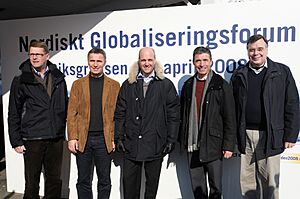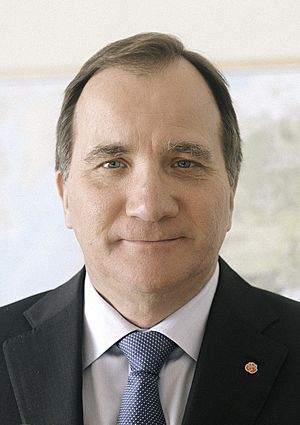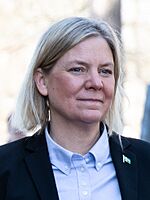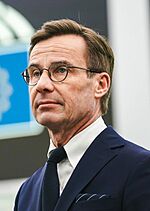History of Sweden (1991–present) facts for kids
After a time of fast growth and good money in the late 1980s, the Swedish economy got too hot by 1990. When a plan to freeze salaries and stop strikes failed, the Social Democratic government, led by Prime Minister Ingvar Carlsson, quit in February 1990. The respected Finance Minister Kjell-Olof Feldt also left because he thought the economic plans were not good. Carlsson soon made a new government. But by the election in September 1991, the economy was getting much worse. Many people lost their jobs. The Social Democrats got their lowest number of votes in sixty years (37.7%). This meant they lost power to a new group of parties, a centre-right team led by Carl Bildt.
Göran Persson from the Social Democrats became Prime Minister in 1996. He stayed in this job until after the 2006 elections. These elections brought the centre-right parties back into government as part of the Alliance.
In the 2000s and 2010s, the Social Democratic party lost more of its power. However, it came back to government in 2014 with Stefan Löfven as leader. The 2010s were a bit messy in politics. The European migration crisis led to the quick rise of the right-wing Sweden Democrats. This party then became very important, balancing power between the two main groups of left and right in Swedish politics. The older political parties did not want to work with the Sweden Democrats. This made it hard to form governments, especially after the 2018 election.
Contents
- The Bildt Era: A Time of Change and Challenges
- The Persson Era: From Tough Choices to EU Ties
- The Reinfeldt Era: New Leadership and Global Roles
- The Löfven Era: Navigating New Political Waters
- The Andersson Era: Sweden's First Female Prime Minister
- The Kristersson Era: A New Right-Wing Government
- Sports: Sweden's Athletic Achievements
The Bildt Era: A Time of Change and Challenges
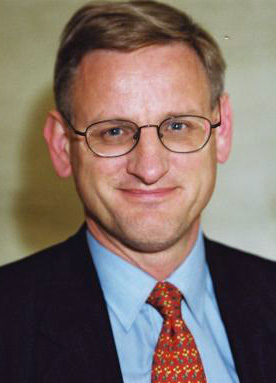
People felt the Social Democrats had not handled the economy well. They also thought some socialist ideas, like state-run TV, radio, phone, and hospital services, were old-fashioned. Because of this, a new party called Ny demokrati (New Democracy) surprised everyone by doing well in the 1991 elections. This helped a new centre-right government to be formed.
This new government was led by Carl Bildt. They wanted to be seen as anti-socialist and modern. They aimed to make many changes. They believed some parts of the Nordic model were causing the economic crisis. So, they started to break up state-run companies, lower taxes, change universities, and prepare Sweden to join the European Union.
However, the new government faced the worst economic crisis in fifty years. This meant that instead of making reforms, they spent almost all their time in power (1991–1994) trying to fix the crisis. Prices for goods went up, house prices went down, and unemployment grew very fast. In late 1992, there was a lot of money trading that shook many European currencies. The Riksbank (Sweden's central bank) briefly raised its interest rate to 500% to protect the value of the Swedish krona. But it had to let the krona float freely against other currencies. The krona immediately dropped about 15% against the US Dollar.
During 1991 and 1992, a housing bubble from the 1980s burst. This left many banks almost out of money. The government had to step in with the Swedish banking rescue. They promised to protect all money in the nation's 114 banks. Some banks were even taken over by the state. This cost 64 billion SEK.
The government's money ran out quickly from 1992 onwards. The country's debt grew a lot. To solve this, the government worked with the Social Democrats to agree on ways to fight the crisis. But even with these agreements, the tough times and deep recession lasted through the 1990s.
Because of these problems, many people saw the Bildt government as a failure. They could not make the reforms they wanted, which upset their voters. People also felt they did not handle the crisis well and made mistakes, like the costly defense of the krona. This sent many undecided voters back to the Social Democrats.
The Bildt era did not bring many lasting policy changes, except for things like commercial TV/Radio and school vouchers. But its biggest impact was that many people started to connect a non-Social Democrat government with bad times. The Social Democrats used this idea in the next three elections. This kept centre-right parties out of power for the next twelve years. However, in recent years, the Bildt government's reputation has improved. This is partly because of how well they handled the bank bailouts, which was praised internationally.
The Persson Era: From Tough Choices to EU Ties
The 1994 elections brought back Ingvar Carlsson's Social Democratic government, but it was a minority government. A sad event during this time was the loss of the car and passenger ferry MS Estonia in the Baltic Sea on September 28. 852 people died, most of them Swedish. This was one of the worst sea disasters in modern history. One good thing that happened was Sweden's surprising success in the 1994 FIFA World Cup, where Team Sweden won a bronze medal.
Göran Persson became finance minister. He had the hard job of balancing the budget by cutting social programs and benefits. Most Swedes did not like this at first. But he was later respected for this achievement. After Carlsson retired in 1996, Persson took over as Prime Minister. He stayed in power until he lost the 2006 elections. This ended 12 years of Social Democratic rule.
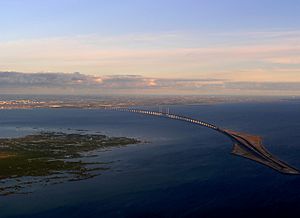
Sweden joined the European Union in 1995. This happened after a public vote the year before. Joining the EU was a big moment in Swedish history. It showed the end of Sweden's special way of doing things and its neutrality. For much of the 20th century, Sweden often kept to itself and stayed distant from Europe. EU membership changed this. But most voters were still unsure about the EU. It is likely that the vote to join only passed because of the very bad economic times. The Öresund Bridge between Malmö in Sweden and Copenhagen in Denmark opened in 2000. It is sometimes seen as a symbol of Sweden's stronger connections to Europe.
In the late 1990s, the Swedish Armed Forces became much smaller. The number of young men joining the military dropped a lot. But Sweden still sent troops to UN peacekeeping forces, especially during the Yugoslav wars. Former Prime Minister Carl Bildt was even a special envoy for the EU and later the UN during these conflicts.
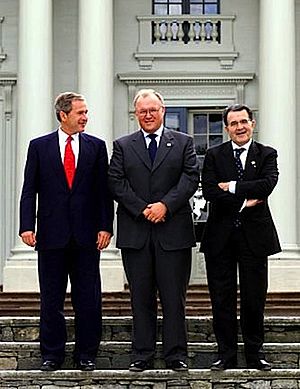
In the first half of 2001, Sweden was in charge of the EU Presidency. They hosted many important meetings. This ended with a big meeting in Gothenburg in June. George W. Bush, the US President, and all the main EU leaders visited. This was the first time a sitting US President visited Sweden. This meeting was an important step for the EU to expand eastward three years later. But the event also saw protesting left-wing groups rioting and attacking police in the city.
In 2003, after years of talks, a vote was held on whether Sweden should use the euro currency. The answer was a clear "no." This vote surprised many politicians, business people, and media. They had strongly supported joining the euro. The campaign was sadly cut short four days before the vote. Foreign Minister Anna Lindh was killed. If she had lived, she would likely have become Prime Minister after Göran Persson.
The killing of Foreign Minister Anna Lindh in September 2003 was not linked to the euro campaign. Also, polls showed weeks before the vote that people were likely to say no to the euro. But both the Gothenburg riots and the "no" vote showed that many Swedes, especially young people, felt left out by the new EU-focused country they lived in.
On December 26, 2004, during the Christmas holidays, 543 Swedish people in Thailand and other parts of South and Southeast Asia were among thousands killed by a huge tsunami. This tsunami came from a powerful undersea earthquake off Indonesia. A memorial service was held in Stockholm in January 2005.
The Ministry for Foreign Affairs was not fully staffed due to the holidays. The government's slow response caused a political problem. This shook trust in Persson's government, especially for Swedish Foreign Minister Laila Freivalds. She later resigned after another problem. She had known beforehand that the Swedish Security Service shut down the Sweden Democrats' website. This website showed the famous Muhammad cartoons. Swedish newspapers said this was the first time the Swedish government had censored something because of a foreign threat since World War II. Sweden is one of the few Western countries where these cartoons were not published in major media. But Sweden was still affected because it is close to Denmark and Norway. A Norwegian-Danish-Swedish dairy company, Arla, faced boycotts in the Middle East. When Minister for International Development Cooperation Carin Jämtin went to Sudan to look into the Darfur genocide, the governor of Darfur used the cartoons as an excuse not to meet her.
The Reinfeldt Era: New Leadership and Global Roles
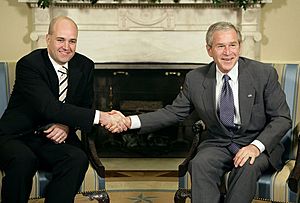
Several new political parties ran in the 2006 election. These included Feminist Initiative, the euro-skeptical June List, and the anti-copyright Pirate Party. They got media attention but did not win many votes. In this election, a conservative group called "Allians för Sverige" ("Alliance for Sweden") won most seats in parliament. They presented Fredrik Reinfeldt from the Moderates as their candidate for prime minister. The Sweden Democrats also did well, winning seats in several local councils and getting 2.9% of the national votes. This worried the older parties.
During the first week of the new government, there were some problems. Some ministers from the Moderate Party had not paid their television license fees and had paid maids illegally. Ministers Maria Borelius and Cecilia Stegö Chilo resigned after only a few days. The government was also criticized for not having enough women or people from different backgrounds. However, supporters pointed out that Sweden now had its first African-born minister (Nyamko Sabuni) and its first openly gay minister (Andreas Carlgren). Foreign Minister Carl Bildt was questioned about his past role in a company called Vostok Nafta. People wondered if this would affect his views on the planned Nord Stream 1 pipeline. This pipeline was meant to go between Russia and Germany under the Baltic Sea, through Swedish waters.
Reinfeldt's plan focused on lowering unemployment. He aimed to do this by lowering taxes and reducing benefits for sick and unemployed people. Until the subprime crisis started, employment went up. But the opposition parties said this was mainly because of good global economic times.
In the second half of 2009, Sweden was in charge of the EU Presidency. During this time, Reinfeldt represented the EU at important meetings with Barack Obama and other world leaders. This included the 2009 United Nations Climate Change Conference in Copenhagen. Reinfeldt also led the final talks about putting the The Lisbon Treaty into action. This treaty started on December 1, 2009. It led to the appointment of Herman Van Rompuy as President of the European Council and Catherine Ashton as High Representative of the Union for Foreign Affairs and Security Policy.
However, Reinfeldt did not get the same boost in public opinion that Persson got from hosting the EU Presidency in 2001. In polls before the 2010 election, support for his government was always lower than for the Social Democratic opposition. The Social Democrats joined with the Green Party in December 2008 to form a Red-Green coalition. They wanted to challenge the ruling liberal alliance. From 2009, the Sweden Democrats consistently had more than 4% support in polls. Along with the Pirate Party, which got 7.1% in the 2009 EU Parliament election, they had the chance to become "kingmakers." This meant they could change the political situation in the 2010 election.
However, even though the Sweden Democrats got 5.7% of the votes and Reinfeldt's government got 49.7%, the ruling government stayed in power as a weaker minority government. The Sweden Democrats' hopes of being kingmakers were dashed. Both possible prime ministers said publicly they would never work with the Sweden Democrats. Instead, both the Social Democrats and the Green party sometimes helped the liberal alliance to keep the government stable.
In December 2009, Cecilia Malmström was chosen as the new EU Commissioner, taking over from Margot Wallström.
Following in her father's footsteps by marrying a commoner, Crown Princess Victoria announced her engagement to Daniel Westling on February 24, 2009. The wedding took place on June 19, 2010, in Stockholm. On August 11, 2009, her sister, Princess Madeleine, announced her engagement to Jonas Bergström. However, their planned wedding was called off in 2010. Princess Madeleine married New York banker Christopher O'Neill in June 2013.
After the 2010 election, the Alliance formed a new government. Reinfeldt continued as prime minister. His government had 24 ministers, three more than before. The Moderates got 13 positions. The Liberals (4), Centre (4), and Christian Democrats (3) kept the same number of ministers. Jan Björklund, the leader of the Liberal Party, became Deputy Prime Minister. Carl Bildt stayed as Foreign Minister, and Anders Borg remained Minister for Finance.
Reinfeldt released a statement saying his government would "seek broad-based and responsible solutions." He also said it would be "natural...to hold regular discussions with the Green Party, and also the Social Democratic Party where appropriate." This meant that the government's bigger reforms would stop. All decisions needed to be approved by one of the opposition parties. It also meant that the opposition, if supported by the Sweden Democrats, could get a majority in parliament. This happened with important issues like unemployment benefits and healthcare.
Stefan Löfven won the 2014 Swedish general election and formed a new government. In his first few months, he faced a challenge when the Sweden Democrats voted against his budget. In 2015, the number of people seeking asylum, mainly from Syria, Iraq, and Afghanistan, reached its highest level ever.
In 2019, Löfven was re-elected for a second term. He formed a coalition government with the Green Party. This time, his government had fewer seats than before. So, it needed the support of the Greens, the Centre Party, and the Liberals. The Alliance of the four centre-right parties (Moderates, Centre Party, Liberals, and Christian Democrats) basically ended during the attempts to form a government.
Differences about whether the right-wing Sweden Democrats should be part of a centre-right government split the Alliance. This led to the Centre Party and Liberals signing an agreement with the Social Democrats and Greens in January 2019. The more conservative Moderates and Christian Democrats were not happy. The Christian Democrats' leader, Ebba Busch Thor, even said the Alliance was "a closed chapter."
The January Agreement was the document that kept Löfven's minority government in power. The Centre Party and Liberals agreed to let Stefan Löfven be Prime Minister. In return, the policies of these two centre-right parties would be important in the government. The agreement included many liberal economic changes. The most notable ones were getting rid of some taxes and making sure private companies could make money from their work in public services. The agreement also stated that the socialist Left Party would not have any power in Swedish politics for the next few years.
A government crisis happened in June 2021. Löfven was removed by parliament in a vote of no-confidence. The Left Party did not like a plan to allow market-based rents on new homes. They said they would start a no-confidence vote unless the plan was stopped. The Sweden Democrats started the vote. Together with the Left Party and the right-wing opposition parties, they formed a majority against the Prime Minister. Löfven was given one week to either call a new election or resign. He chose to resign on June 28. The Speaker of Parliament, Andreas Norlén, then asked Moderate Party leader Ulf Kristersson to try and form a government. But Kristersson could not get enough support. On July 7, 2021, Sweden's parliament supported Stefan Löfven's return as prime minister. This happened weeks after he became the first Swedish leader to lose a no-confidence vote.
The Andersson Era: Sweden's First Female Prime Minister
In August 2021, Prime Minister Stefan Löfven announced he would resign. Magdalena Andersson, who was the finance minister, was chosen as the new leader of Sweden's ruling Social Democrats in November 2021. On November 30, 2021, Magdalena Andersson became Sweden's first female prime minister. She formed a minority government made up only of her Social Democrats. Her plan to form a new government with the Green Party did not work because her budget proposal failed to pass.
In May 2022, Sweden officially asked to join the NATO alliance.
The general election in September 2022 ended with a close win for a group of right-wing parties. This meant that Magdalena Andersson's government had to resign.
The Kristersson Era: A New Right-Wing Government
On October 18, 2022, Ulf Kristersson from the Moderate Party became the new Prime Minister of Sweden. Kristersson's Moderates formed a centre-right government with the Christian Democrats and the Liberals. This new government is supported by the biggest right-wing party, the Sweden Democrats (SD), led by Jimmie Åkesson. This means tougher rules on immigration will be a key part of their agreement with the SD. Soon after his appointment, the new foreign minister, Tobias Billström, announced that Sweden would stop its "feminist foreign policy," which was used by the previous left-wing government.
On March 7, 2024, Sweden officially became the 32nd member country of NATO.
Sports: Sweden's Athletic Achievements
Sweden has continued to do very well in sports. In alpine skiing, Pernilla Wiberg and Anja Pärson have been successful. In golf, Annika Sörenstam is famous. In ice hockey, stars like Mats Sundin, Nicklas Lidström, and Peter Forsberg have shone. In football, names like Tomas Brolin, Henrik Larsson, and Zlatan Ibrahimović are well-known.
Sweden has also become a strong country in track and field. World champions include Carolina Klüft, Kajsa Bergqvist, Stefan Holm, Christian Olsson, and Susanna Kallur. Sweden hosted the World Championships in 1995 and the European Championships in 2006, both in Gothenburg. The national swimming team has had champions like Anders Holmertz, Therese Alshammar, and Emma Igelström. In 2006, the ice hockey team won gold at the Turin Olympics and also at the World Championship in Riga. They were the first hockey team ever to win both the Winter Olympics and the World Championships in the same year.
Sweden is eighth in the all-time Olympic Games medal count. It is ninth for the Summer Olympic Games and sixth for the Winter Olympic Games. Even though some of this success can be explained by other countries being affected by World Wars and Cold War boycotts, Sweden remains a strong country in sports despite its small size.
In 2001, Sven-Göran Eriksson became the first foreign manager of the English national football team. He had successfully managed many famous clubs before. He led the English team in two World Cups and Euro 2004. He was even listed as one of the "100 Greatest Swedes" in a newspaper in 2009. Elin Nordegren married professional golfer Tiger Woods in 2004. She gained worldwide attention during their public separation in late 2009.
|
 | Victor J. Glover |
 | Yvonne Cagle |
 | Jeanette Epps |
 | Bernard A. Harris Jr. |


